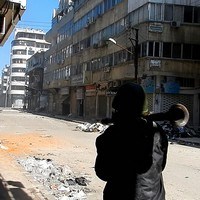The termination of the European Union embargo on providing military equipment to Syria's rebels, combined with renewed efforts in the U.S. Congress to goad the Obama administration into providing arms to the anti-Assad opposition, suggests that the West will soon become more directly involved in aiding the fight against the regime of Syrian President Bashar al-Assad.
The shift comes despite the near absence of domestic support in any NATO-member country for inserting troops directly into the fighting, and with concerns that establishing and enforcing any sort of no-fly zone over Syrian airspace might expose Western aircrews to unacceptable levels of risk, particularly as new Russian air defense missiles are said to be on their way to Syria. This leaves sending military equipment and training the anti-Assad forces in how to use some of the more sophisticated weaponry as the preferred option for escalation. Some analysts predict that London, Paris and Washington will be providing arms to the opposition by summer. If that is the case, they ought to proceed with their eyes fully open, having weighed all the possible consequences.
The first issue to consider is that, despite politicians’ rosy promises to the contrary, the West will lose effective control over whatever weapons it sends. During World War II, Josef Stalin used American trucks, sent to him under the Lend-Lease program to fight the Nazis, to coordinate the deportation of the Chechen people. Over the years, there have been complaints about how a number of U.S. partners, including Georgia, Turkey and Israel, have used military equipment provided by the United States. Indeed, America’s 1980s experiences with supplying arms to the mujahedeen in Afghanistan and the contras in Nicaragua highlight some of the problems with weapons transfers. Groups on the ground may want to horde weapons for use in internecine battles with rivals to establish their dominance after the enemy has been defeated. Gulbuddin Hekmatyar, the Afghan commander who received the lion's share of military aid from the U.S., Pakistan and Saudi Arabia during the fight against the Soviets, was notorious for his attacks against rival mujahedeen groups, especially those led by Ahmad Shah Massoud. Some of the weapons he received from the West were used, not to drive out the Soviets, but to turn parts of Kabul into smoking rubble during the 1990s when he attempted to take power for himself.

